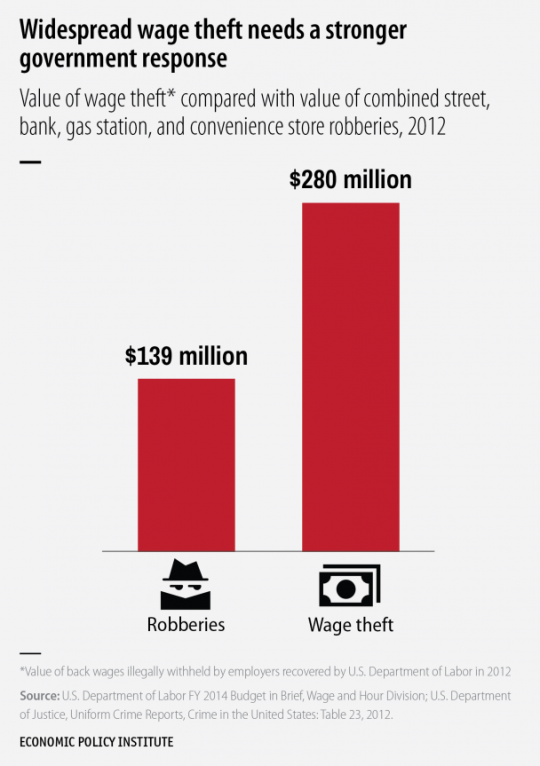May 1, 2015
The Crimes We Ignore
If you were robbed and had your wallet stolen, you’d probably call the cops and expect that someone would investigate, identify, and prosecute the robber.
But what if your employer promised to pay you a certain amount for your work, and then at the end of the day refused to do so? Or what if your employer had you work overtime, then didn’t pay you any extra?
That’s wage theft, and it’s a crime that costs more every year than the combined loss from convenience store, gas station, bank, and street robberies. By some counts, more than two-thirds of low-wage workers experience some form of wage theft every year.

Most of us assume that if a crime is committed against us or if someone breaks a contract with us, we can call on law enforcement to intervene. But all too often when it comes to wage theft, there’s no one willing to investigate. And to make matters worse, many workers face retaliation – things like having their hours cut or being fired – when they try to get the pay they are due.
Here in Virginia, the state agency that is supposed to investigate claims of wage theft has been so underfunded for so long that it is only able to fully investigate a fraction of the complaints it receives. Other complaints are dismissed without full investigation, including in cases where the employer has never responded to the charges.
And for a brief period, the state actually completely defunded its Labor and Employment Law office. That left workers with complaints of violations of state labor laws with virtually nowhere to turn. This would be like if a city council decided it no longer had the resources to do even cursory investigations of convenience store robberies, so it just wasn’t going to assign any detectives to them.
Today is May Day, the day workers and their allies around the world celebrate the struggle and gains of the labor movement, including the basic protections we now take for granted in this country, like an eight-hour work day, the right to organize, bans on child labor, and the minimum wage. But it’s not enough to rest on our laurels and celebrate past victories, especially when today’s workers find it difficult-to-impossible to get their government to enforce some of those very basic protections.
Theft is theft, and workers deserve somewhere to turn.
–Laura Goren, Senior Policy Analyst
